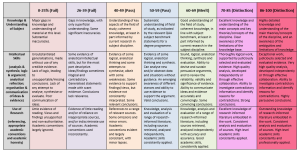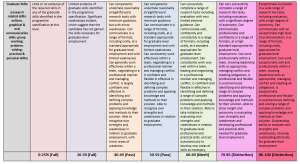- D/618/7406 Unit 5: Challenges of IT Security in Modern Organizations – Risks, Solutions & Best Practices
- HSC Level 2/3 Unit 012 Assignment: Care Worker Responsibilities and Ways of Working
- CIPD Level 5HR03 Assignment: Understanding Reward Approaches and Their Impact on Performance and Contribution
- CIPD level 5HR02 Assignment: Talent Management and Workforce Planning Unit Guide
- Level 3 D/615/3823 Assignment: Regulation, Protection, and Collaborative Practice in Health and Social Care
- PGM216D Assignment: Bicycle Store Sales Management Application
- MATH6033 Assignment: Epidemiological Investigation of Cardiovascular Health and Tea Consumption Risks
- EH6147 Assingment: Stakeholder Analysis for Quality Improvement in Hand Hygiene Compliance
- Assignment: Investigation of Solution Concentration Through Standard Preparation, Titration, and Colorimetry Techniques
- MATH6033 Assignment: Cardiovascular Risk and Tea Drinking: Epidemiological Analyses
- CIPD level 3 3CO03 Assignment: Core behaviours for people professionals
- DAC4B1: Personal development in adult care settings
- Unit 19 Research Project Assignment 1: Impact of Corporate Social Responsibility on Business Success & Community Wellness
- EG5022 Assignment: Georeferencing and Accuracy Assessment of a Quarry 3D Model Using Photogrammetric GCPs
- Assignment: Financial Performance and Strategic Analysis of a UK Listed Company: A CORE Evaluation and Reflective Review
- 5CNMN002W Assignment: Advanced measurement- Major measurement taking off
- K/650/2298 Level 3 Understanding Roles, Responsibilities, and Effective Partnerships in Health and Social Care
- Understanding Information and Knowledge Management in the Workplace: A Briefing for HR Professionals
- HRM7010D Strategic Use of People Analytics in Enhancing Organisational Value and Agility
- OTHM Level 5: J/650/1143 Research Methods in Health and Social Care
TOWN1060 Urban Planning in the UK History Sustainable Design and Future City Development
| University | MidKent College |
| Subject | TOWN1060 The Urban Environment |
Module Learning Outcomes Covered in Assessment
- LO1: Evaluate the impact of a wide range of political, social, economic and technological factors on urban development.
- LO2: Explain the impact of urban living and urban design on human behaviour and the development of communities.
- LO3: Explain the historical development of planning systems in the United Kingdom.
- LO4: Investigate environmental issues that affect the sustainability of urban areas.
Assignment Brief and Guidance
Background
You work in a local authority planning office and you have been assigned to mentor a new employee. Additionally, your name has been put forward to be part of an industry-wide think tank on the way forward for designing cities of the future.
Do You Need Assignment of This Question
Tasks
- Research and explain the history of planning in the United Kingdom in report format to place in context for a new employee in your LA planning department.
- Research and consider urban issues from your own perspective and that of society as a whole when making recommendations for an industry wide think tank, CITT, representing the AEC (Architecture Engineering and Construction) industry with a report to the government.
- With reference to Task 1 above provide an account of how sustainable policies have gradually become adopted by governments, local authorities and designers.
- With reference to Task 2 above provide an account of problems and solutions for sustainable design in cities and rural areas, including innovative technology dealing with energy sources, phenomena such as ‘heat islands’, transport, communication, human wellbeing, eco diversity and measures to deal with rainfall, flooding and water supply, all within a range of issues connected with modern living.
Notes
This is a stand-alone assignment.
There may be contextual information in relation with other modules, such as to do with building regulations, transport, economics, politics, devolution, housing policy, affordability and current trends such as sustainability and climate change.
Indicative Content Listed in Specification
- Political, social, economic and technological factors: Historical processes: pre-industrial city, impact of industrial revolution, growth of towns and cities, impact of new transport systems, communications/technological revolutions, new building methods and materials, urban sprawl, garden cities, green belts, new towns and expanded towns, ‘world cities’ and globalisation. Urban structures: hierarchies of urban areas, classification of towns and cities, central place theory, the city region, patterns of urban land uses, ‘bid rent curves’, concentric zone, sector models of urban structure.
- Urban living and urban design: individual and the urban environment: perception, ‘mental maps’, effect of crowding, pollution, noise and stress, individual behaviour, isolation and opportunity for integration. Communities and the urban environment: concept of ‘community’, social area analysis, link between community and ‘neighbourhood’. Role of urban design; impact of design on human behaviour, development of communities, defensible space, social impact of urban renewal.
- Planning system within the United Kingdom. Emergence of modern planning system: twentieth century planning legislation, Town and Country Planning Act 1947, subsequent Town and Country Planning Act 1990, Planning and Compensation Act 1991, National Planning Policy 2012. Key elements; definition of development, development control process, types of planning permission, effect of General Permitted Development Order and Use Classes Order, Structure, Local and Unitary plans, Planning Policy Guidance notes (PPGs), Regional Planning Guidance (RPGs). Key issues in planning policy: protection of traditional centres against off-centre, edge-of-town and out-of-town developments, impact of new technology and home-working on demand for office floor space, changing relationship between home and work, distribution of future population and of new housing development, use of brownfield and Greenfield sites, protection of green belts and of environmentally sensitive areas, achievement of ‘sustainable’ development.
- Environmental issues: global issues; sustainable construction, bio-diversity, global warming, deforestation, depletion of ozone layer, acid rain, finite nature of fossil fuels. Local issues: pollution; air, water, noise, increased water extraction, contaminated land, remediation, land-fill waste; environmental assessment systems, BREEAM, impact of construction processes, flooding & heatwave
Mark Scheme (Rubric)
All tasks are marked in line with the below assessment rubric.
Internal Verification / Moderator Commentary & Signature
Moderator Commentary.
Signed: – Date: – 28/02/25
Buy Answer of This Assessment & Raise Your Grades


If you are stuck on the TOWN1060 Urban Environment assignment, then don’t worry, Engineering Assignment Helper can relieve you from worry. Our varietors are PhD qualified who have a good command over all the subjects. Here, you will find free assignment samples that can help you to determine the quality. So contact us and get your best UK assignment help service!



